
Philip Kindred Dick, often referred to by his initials PKD, was an American science fiction writer and novelist. He wrote 44 novels and about 121 short stories, most of which appeared in science fiction magazines during his lifetime. His fiction explored varied philosophical and social questions such as the nature of reality, perception, human nature, and identity, and commonly featured characters struggling against elements such as alternate realities, illusory environments, monopolistic corporations, drug abuse, authoritarian governments, and altered states of consciousness. He is considered one of the most important figures in 20th-century science fiction.

The Man in the High Castle is an alternative history novel by Philip K. Dick, first published in 1962, which imagines a world in which the Axis Powers won World War II. The story occurs in 1962, fifteen years after the end of the war in 1947, and depicts the life of several characters living under Imperial Japan or Nazi Germany as they rule a partitioned United States. The eponymous character is the mysterious author of a novel-within-the-novel entitled The Grasshopper Lies Heavy, a subversive alternative history of the war in which the Allied Powers are victorious.
"The Variable Man" is a science fiction novella by American writer Philip K. Dick, which he wrote and sold before he had an agent. It was first published in the British magazine Space Science Fiction Vol. 2 No. 2, July 1953, and in the American version in September 1953, with the US publication illustrated by Alex Ebel. Despite the magazine cover dates it is unclear whether the first publication was in the UK or in the United States where magazines tended to be published farther ahead of their cover dates than in the UK. The Variable Man can be found in several collections of Dick's short stories, including The Variable Man and The Short Happy Life of the Brown Oxford.
The Owl in Daylight is a novel Philip K. Dick was writing at the time of his death in 1982. He had already been paid an advance for the book by the publisher and was working against a deadline. After his death, his estate approached other writers about the possibility of someone completing the novel based on his notes, but that proved to be impossible, as he had never formally outlined the story. Dick viewed the novel as his Finnegans Wake. The idea was inspired partly by an entry in the Encyclopædia Britannica on Beethoven that referred to him as the most creative genius of all time, partly by traditional views of what constitutes the human heaven, and finally by the Faust story.
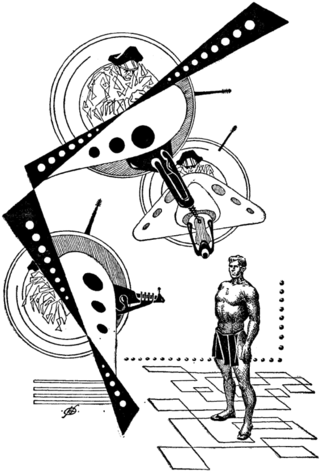
"The Golden Man" is an 11,600-word science fiction short story by American writer Philip K. Dick. It was received by the Scott Meredith Literary Agency on June 24, 1953, and first published in the April 1954 issue of If magazine. The story was illustrated by Kelly Freas in its original publication. The story is set in a post-apocalyptic future where the existence of potentially powerful mutants has become a reality. The mutants are seen as dangerous and have been hunted to death by human beings for years. A golden-skinned mutant called Cris is captured by the government, which attempts to execute him. However, his appearance and abilities to see into the future allow him to escape.
"The Last of the Masters" is a science fiction novelette by American writer Philip K. Dick. The original manuscript of the story was received by the Scott Meredith Literary Agency on July 15, 1953, and the story was published by the Hanro Corporation in the final issue of Orbit Science Fiction in 1954. It has since been reprinted in several Philip K. Dick story collections, beginning with The Golden Man in 1980.
"The Turning Wheel" is a novelette by American science fiction writer Philip K. Dick. It was published in Science Fiction Stories No. 2, 1954.

"Shell Game" is a science fiction short story by American writer Philip K. Dick. It was submitted to the Scott Meredith Literary Agency and received by SMLA on December 12, 1953. It was published in Galaxy Science Fiction in September 1954.
"Breakfast at Twilight" is a science fiction short story by American writer Philip K. Dick. It was received by the Scott Meredith Literary Agency on January 17, 1953 and first published in Amazing Stories, July 1954. It appears in the second volume reprint of Philip K. Dick's short stories Second Variety.
"Roog" is a science fiction short story by American writer Philip K. Dick. It was his first sold work, although not his first published story.
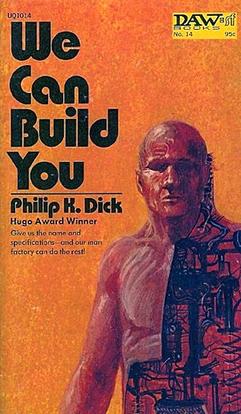
We Can Build You is a 1972 science fiction novel by American writer Philip K. Dick. Written in 1962 as The First in Our Family, it remained unpublished until appearing in serial form as A. Lincoln, Simulacrum in the November 1969 and January 1970 issues of Amazing Stories magazine, re-titled by editor Ted White. The novel was issued as a mass market paperback original by DAW Books in 1972, its final title provided by publisher Donald A. Wollheim. Its first hardcover edition was published in Italy in 1976, and Vintage issued a trade paperback in 1994.
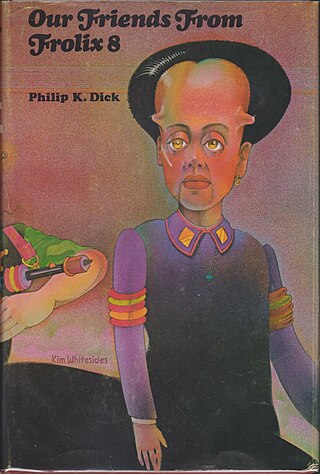
Our Friends from Frolix 8 is a 1970 science fiction novel by American writer Philip K. Dick. The novel is set in the 22nd century, where humanity is ruled by mutated humans, "New Men" and "Unusuals", while normal "Old Men" are discriminated against. The story follows Nick Appleton, a low-class worker who falls in love with a subversive agent, while Thors Provoni has gone deep into space to find an ally to the resistance.
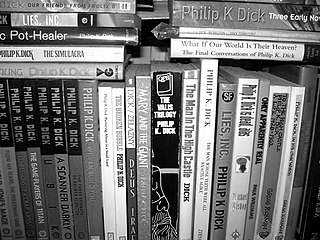
The bibliography of Philip K. Dick includes 44 novels, 121 short stories, and 14 short story collections published by American science fiction author Philip K. Dick during his lifetime.

Mary and the Giant is an early, non-science fiction novel written by Philip K. Dick in the years between 1953 and 1955, but not published until 1987.

Humpty Dumpty in Oakland is a realist, non-science fiction novel authored by Philip K. Dick. Originally completed in 1960, but rejected by prior publishers, this work was posthumously published by Gollancz in the United Kingdom in 1986. An American edition was published by Tor Books in 2007.

A Handful of Darkness is a collection of science fiction and fantasy stories by American writer Philip K. Dick. It was first published by Rich & Cowan in 1955 and was Dick's first hardcover book.
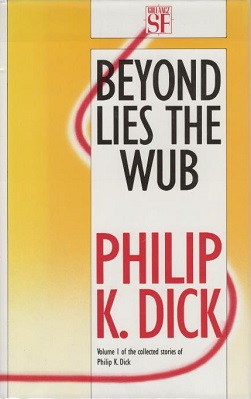
Beyond Lies the Wub is a collection of science fiction stories by American writer Philip K. Dick. It was first published by Gollancz in 1988 and later comprised Volume I of The Collected Stories of Philip K. Dick. Many of the stories had originally appeared in the magazines Fantasy and Science Fiction, Planet Stories, If, Galaxy Science Fiction, Imagination, Space Science Fiction, Fantastic Story Magazine, Amazing Stories, Future, Cosmos, Fantasy Fiction, Beyond Fantasy Fiction, Thrilling Wonder Stories, Startling Stories. The collection was reprinted by Citadel Press in 2003 under the title Paycheck and Other Classic Stories.

The Short Happy Life of the Brown Oxford is a collection of science fiction stories by American writer Philip K. Dick. It was first published by Citadel Twilight in 1990 and reprints Volume I of The Collected Stories of Philip K. Dick. Many of the stories had originally appeared in the magazines Fantasy and Science Fiction, Planet Stories, If, Galaxy Science Fiction, Imagination, Space Science Fiction, Fantastic Story Magazine, Amazing Stories, Future, Cosmos, Fantasy Fiction, Beyond Fantasy Fiction, Thrilling Wonder Stories and Startling Stories. The collection was reprinted by Citadel Press in 2003 under the title Paycheck and Other Classic Stories.
"Meddler" is a science fiction short story by American writer Philip K. Dick. It was first published in Future Science Fiction, October 1954 with illustration by Virgil Finlay. Dick had submitted many short stories to magazines and made approximately fifteen sales before becoming a client of the Scott Meredith Literary Agency. This was his second SMLA submission, received by SMLA on July 24, 1952. His first SMLA submission was The Builder, received by SMLA on July 23, 1952.

American author Philip K. Dick (1928–1982) is best known for his science fiction works, but he also wrote non-genre fiction, much of which remained unpublished until after his death. From 1952 to 1960, Dick wrote eleven non-genre novels, only one of which was published during his lifetime. Seven more were published posthumously, but the remaining three – A Time for George Stavros, Pilgrim on the Hill and Nicholas and the Higs – are considered lost. Short plot summaries of these works are preserved among the index cards written by employees of the Scott Meredith Literary Agency, who were responsible for marketing the novels to publishers, while further information can be derived from Dick's letters, and from the testimony of those who knew him.













